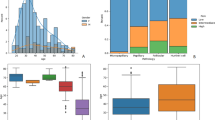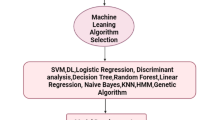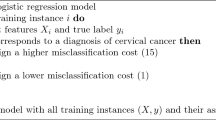Abstract
Purpose
Ovarian cancer is oftendiagnosed late due to vague symptoms, leading to poor survival rate. Improved screening tests could mitigate this issue. This narrative review examines the potential and challenges of integrating artificial intelligence (A.I.) into ovarian cancer screenings, with a focus on improving early detection, diagnosis, and personalized risk assessment.
Method
A comprehensive review of existing literature was conducted, analyzing studies and discussions within the scientific community.
Results
A.I. shows promise in significantly improving the ovarian cancer screening processes, increasing accuracy, efficiency, and resource allocation. However, data quality and bias issues pose considerable challenges, potentially leading to healthcare disparities.
Conclusions
Integrating A.I. into ovarian cancer screenings offers potential benefits but comes with significant challenges. By promoting diverse data collection, engaging with underrepresented groups, and ensuring ethical data use, A.I. can be harnessed for more accurate and equitable ovarian cancer diagnoses.
Similar content being viewed by others
Data Availability
No applicable.
Code Availability
No applicable.
References
AI for Scientific Discovery - Oct. 12–13 Workshop| National Academies. Accessed: Oct. 30, 2023. [Online]. Available: https://www.nationalacademies.org/news/2023/10/ai-for-scientific-discovery-oct-12-13-workshop.
Amisha P, Malik M, Pathania, Rathaur VK. Overview of artificial intelligence in medicine, J Family Med Prim Care, vol. 8, no. 7, pp. 2328–2331, Jul. 2019, https://doi.org/10.4103/jfmpc.jfmpc_440_19.
Xu H, et al. Artificial intelligence–assisted colonoscopy for colorectal cancer screening: a multicenter randomized controlled trial. Clin Gastroenterol Hepatol. Feb. 2023;21(2):337–e3463. https://doi.org/10.1016/j.cgh.2022.07.006.
Kawakami E, et al. Application of Artificial Intelligence for preoperative diagnostic and prognostic prediction in epithelial ovarian cancer based on blood biomarkers. Clin Cancer Res. May 2019;25(10):3006–15. https://doi.org/10.1158/1078-0432.CCR-18-3378.
Laios A, Theophilou G, De Jong D, Kalampokis E. The future of AI in ovarian cancer research: the large language models perspective. Cancer Control. 2023;30:10732748231197915. https://doi.org/10.1177/10732748231197915.
Cancer of the Ovary - Cancer Stat Facts, Accessed SEER. Oct. 30, 2023. [Online]. Available: https://seer.cancer.gov/statfacts/html/ovary.html.
Ovarian Cancer Stages. Knowledge is Power, OCRA. Accessed: Oct. 30, 2023. [Online]. Available: https://ocrahope.org/get-the-facts/staging/.
Golia T, D’Augè et al. Aug., Prevention, screening, treatment and follow-up of gynecological cancers: state of art and future perspectives, Clin. Exp. Obstet. Gynecol, vol. 50, no. 8, p. 160, 2023, https://doi.org/10.31083/j.ceog5008160.
Torre LA et al. Ovarian cancer statistics, 2018, CA: A Cancer Journal for Clinicians, vol. 68, no. 4, pp. 284–296, 2018, https://doi.org/10.3322/caac.21456.
Huang S, Yang J, Fong S, Zhao Q. Artificial intelligence in cancer diagnosis and prognosis: opportunities and challenges. Cancer Lett. Feb. 2020;471:61–71. https://doi.org/10.1016/j.canlet.2019.12.007.
Tanabe K, et al. Comprehensive Serum Glycopeptide Spectra Analysis Combined with Artificial Intelligence (CSGSA-AI) to Diagnose Early-Stage Ovarian Cancer. Cancers, vol. 12, no. 9, Art. no. 9, Sep. 2020, https://doi.org/10.3390/cancers12092373.
Cirillo D et al. Jun., Sex and gender differences and biases in artificial intelligence for biomedicine and healthcare, npj Digit. Med, vol. 3, no. 1, Art. no. 1, 2020, https://doi.org/10.1038/s41746-020-0288-5.
Chen Z. Ethics and discrimination in artificial intelligence-enabled recruitment practices. Humanit Soc Sci Commun. Sep. 2023;10(1):567. https://doi.org/10.1057/s41599-023-02079-x.
Murdoch B. Privacy and artificial intelligence: challenges for protecting health information in a new era. BMC Med Ethics. Sep. 2021;22(1). https://doi.org/10.1186/s12910-021-00687-3.
Keskinbora KH. Medical ethics considerations on artificial intelligence. J Clin Neurosci. Jun. 2019;64:277–82. https://doi.org/10.1016/j.jocn.2019.03.001.
Low EL, Waller J, Menon U, Jones A, Reid F, Simon AE. Ovarian cancer symptom awareness and anticipated time to help-seeking for symptoms among UK women, J Fam Plann Reprod Health Care, vol. 39, no. 3, pp. 163–171, Jul. 2013, https://doi.org/10.1136/jfprhc-2012-100473.
Huepenbecker SP et al. Nov., Factors impacting the time to ovarian cancer diagnosis based on classic symptom presentation in the United States, Cancer, vol. 127, no. 22, pp. 4151–4160, 2021, https://doi.org/10.1002/cncr.33829.
Lawson-Michod KA, et al. Pathways to ovarian cancer diagnosis: a qualitative study. BMC Womens Health. Nov. 2022;22(1):430. https://doi.org/10.1186/s12905-022-02016-1.
Kaijser J et al. Jan., Improving strategies for diagnosing ovarian cancer: a summary of the International Ovarian Tumor Analysis (IOTA) studies, Ultrasound Obstet Gynecol, vol. 41, no. 1, pp. 9–20, 2013, https://doi.org/10.1002/uog.12323.
Giannini A et al. Sep., PARP Inhibitors in newly diagnosed and recurrent ovarian cancer, Am J Clin Oncol, vol. 46, no. 9, pp. 414–419, 2023, https://doi.org/10.1097/COC.0000000000001024.
Shimabukuro DW, Barton CW, Feldman MD, Mataraso SJ, Das R. Effect of a machine learning-based severe sepsis prediction algorithm on patient survival and hospital length of stay: a randomised clinical trial. BMJ Open Respir Res. 2017;4(1):e000234. https://doi.org/10.1136/bmjresp-2017-000234.
McKinney SM, et al. International evaluation of an AI system for breast cancer screening. Nature. Jan. 2020;577(7788):89–94. https://doi.org/10.1038/s41586-019-1799-6.
Johnson KB, et al. Precision Medicine, AI, and the future of personalized health care. Clin Transl Sci. 2021;14(1):86–93. https://doi.org/10.1111/cts.12884.
Kakileti ST, Madhu HJ, Manjunath G, Wee L, Dekker A, Sampangi S. Personalized risk prediction for breast cancer pre-screening using artificial intelligence and thermal radiomics. Artif Intell Med. May 2020;105:101854. https://doi.org/10.1016/j.artmed.2020.101854.
Mikhael PG et al. Apr., Sybil: A validated deep learning model to predict future lung cancer risk from a single low-dose chest computed tomography, J Clin Oncol, vol. 41, no. 12, pp. 2191–2200, 2023, https://doi.org/10.1200/JCO.22.01345.
Challen R, Denny J, Pitt M, Gompels L, Edwards T, Tsaneva-Atanasova K. Artificial intelligence, bias and clinical safety, BMJ Qual Saf, vol. 28, no. 3, pp. 231–237, Mar. 2019, https://doi.org/10.1136/bmjqs-2018-008370.
Gianfrancesco MA, Tamang S, Yazdany J, Schmajuk G. Potential biases in machine learning algorithms using electronic health record data, JAMA Intern Med, vol. 178, no. 11, pp. 1544–1547, Nov. 2018, https://doi.org/10.1001/jamainternmed.2018.3763.
Panch T, Mattie H, Atun R. Artificial intelligence and algorithmic bias: implications for health systems. J Glob Health, 9, 2, p. 020318, https://doi.org/10.7189/jogh.09.020318.
Zhou Q, Chen Z, Cao Y, Peng S. Clinical impact and quality of randomized controlled trials involving interventions evaluating artificial intelligence prediction tools: a systematic review, npj Digit. Med, vol. 4, no. 1, Art. no. 1, Oct. 2021, https://doi.org/10.1038/s41746-021-00524-2.
Adler P, et al. Auditing black-box models for indirect influence. arXiv. Nov. 2016;30. https://doi.org/10.48550/arXiv.1602.07043.
Blueprint for an AI Bill of Rights| OSTP. The White House. Accessed: Nov. 09, 2023. [Online]. Available: https://www.whitehouse.gov/ostp/ai-bill-of-rights/.
Russell ES, et al. FDA draft guidance to improve clinical trial diversity: opportunities for pharmacoepidemiology. J Clin Trans Sci. 2023;7(1):e101. https://doi.org/10.1017/cts.2023.515.
Michener L, Cook J, Ahmed SM, Yonas MA, Coyne-Beasley T, Aguilar-Gaxiola S. Aligning the goals of community-engaged research: why and how academic health centers can successfully engage with communities to improve health. Acad Med. Mar. 2012;87(3):285. https://doi.org/10.1097/ACM.0b013e3182441680.
Acknowledgements
No funding was received for this study.
Author information
Authors and Affiliations
Corresponding author
Ethics declarations
Ethicial Approval
No applicable.
Consent to Participate
No applicable.
Consent for publication
No applicable.
Conflict of interest
Authors Anna Jeter and Margo Harrison work at AOA Dx, an ovarian cancer diagnostic company. Sierra Silverwood is an unpaid intern at the company.
Additional information
Publisher’s Note
Springer Nature remains neutral with regard to jurisdictional claims in published maps and institutional affiliations.
Rights and permissions
Springer Nature or its licensor (e.g. a society or other partner) holds exclusive rights to this article under a publishing agreement with the author(s) or other rightsholder(s); author self-archiving of the accepted manuscript version of this article is solely governed by the terms of such publishing agreement and applicable law.
About this article
Cite this article
Silverwood, S., Jeter, A. & Harrison, M. The Promise and Challenges of AI Integration in Ovarian Cancer Screenings. Reprod. Sci. (2024). https://doi.org/10.1007/s43032-024-01588-7
Received:
Accepted:
Published:
DOI: https://doi.org/10.1007/s43032-024-01588-7




